| Srl | Item |
| 1 |
ID:
093895


|
|
|
|
|
| Publication |
2010.
|
| Summary/Abstract |
Israel's general elections in 2009 yielded three major outcomes: 1) the replacement of the bi-polar system that characterized Israeli electoral politics between 1977 and 2003 in which most parties are aligned to one of the two principal parties by a more flexible multi-party system. 2) The nearly total collapse of the Labor party and the Zionist left; for the first time since the 1920s, the Labor party was no longer a major political player, and 3). Kadima's electoral relative success, despite scandals haunting it since 2006. Kadima has basically superseded Labor without necessarily adopting its ideology. We argue (contrary to Henry Kissinger's quip that Israel never had a foreign policy but only a domestic policy) that primarily external factors and processes - chiefly the failure of the Oslo process in the 1990s - yielded these three outcomes.
|
|
|
|
|
|
|
|
|
|
|
|
|
|
|
|
| 2 |
ID:
137551
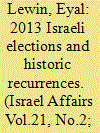

|
|
|
|
|
| Summary/Abstract |
The 2013 election campaign in Israel shows, at first glance, some unanticipated results and unexpected reactions of several political actors. Three events in particular can be noted: (1) the rise of a significant centrist middle-class party; (2) the association of the newly elected right-wing Prime Minister with his left-wing rivals; and (3) the revival of a national religious party after years of decline. A broad overview, however, reveals that from many perspectives numerous key elements of Israeli politics have remained broadly the same over the decades. Some unanticipated outcomes of the elections are to a substantial extent repetitions of past events, referred to in this paper as historic recurrences. In order to establish this claim about historic recurrence, each event is compared to past events with which several striking similarities are found. In order to explain the phenomenon of historic recurrence in Israeli politics, two sets of concepts are applied: the sociological terminology regarding reference group and collective identity, and rational choice theories about voter behaviour and the preferences of political actors.
|
|
|
|
|
|
|
|
|
|
|
|
|
|
|
|
| 3 |
ID:
149189
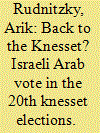

|
|
|
|
|
| Summary/Abstract |
Arab politics in Israel recorded several notable achievements in the March 2015 Knesset elections. Sixteen Arab and Druze candidates were elected to serve in the Israeli parliament, the largest number ever elected. In addition, Arab voter turnout increased significantly compared to previous election campaigns and reached 63.5%, its highest level since the early 2000s, thus reversing a period of political apathy caused by the events of October 2000. These results may indicate a turning point in the political behaviour of the Arab public, and that the Knesset has once again become a relevant arena of political influence for the majority of the Arab public. An analysis of voting patterns in the recent elections in the Arab sector suggests that these changes were spurred by the participation of the Joint List. In many Arab localities, support for the Joint List, which ran as a grouping of the major political parties that have represented the Arab public in recent years, was positively associated with a rising turnout compared to previous elections.
|
|
|
|
|
|
|
|
|
|
|
|
|
|
|
|
| 4 |
ID:
149197
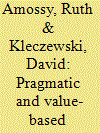

|
|
|
|
|
| Summary/Abstract |
A discursive and argumentative analysis of the Israeli 2015 elections reveals how electoral strategies displayed unexpected similarities between rival parties such as the Likud and the Zionist Union, on the one hand, and the Jewish Home and Meretz, on the other hand, in their respective approaches to foreign policy and to the Israeli–Palestinian conflict. While the mainstream Right and Left mainly emphasized security motives, used consequence-based arguments, and appealed to fear, the practical reasoning of the two smaller parties (Jewish Home and Meretz) competing with the Likud and the Zionist Union applied a value-based rather than a merely instrumental argumentation. This reconfiguration of the political map enlightens the peculiar dynamics of the 2015 elections.
|
|
|
|
|
|
|
|
|
|
|
|
|
|
|
|
| 5 |
ID:
137546
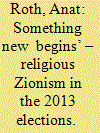

|
|
|
|
|
| Summary/Abstract |
Habayit Hayehudi party was one of the most noteworthy phenomena of the general elections held in Israel in 2013. In the 2009 elections the party's main predecessor only won three seats, and polls conducted in the first half of 2012 cast doubt upon its chances of passing the minimum threshold. Defying these predictions, Habayit Hayehudi won 12 seats to become the fourth largest Knesset party. This article's primary claim is that the party's success derived from its leaders' ability to cater to the aspirations and needs ensuing from the traumatic 2005 Gaza disengagement and to replace the feelings of distress and disorientation with a positive momentum.
|
|
|
|
|
|
|
|
|
|
|
|
|
|
|
|
| 6 |
ID:
137547
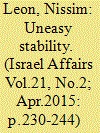

|
|
|
|
|
| Summary/Abstract |
This article examines the emergency election campaign launched by the Haredi parties in anticipation of the 2013 general elections in Israel, in order to attract the votes of those generally perceived as their automatic supporters – the Haredim. The 2013 campaign was a struggle for the ‘converted’ – the Haredi vote – amongst UTJ and Shas supporters alike. The battle was fought openly and assertively. The intensive efforts ultimately achieved what may be described as an uneasy electoral stability. The reasons for this situation, and how the Haredi parties addressed it, is the subject of this article.
|
|
|
|
|
|
|
|
|
|
|
|
|
|
|
|